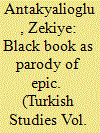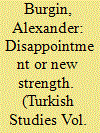| Srl | Item |
| 1 |
ID:
116332


|
|
|
|
|
| Publication |
2012.
|
| Summary/Abstract |
This essay examines Orhan Pamuk's The Black Book as a parody of epic. Mikhail Bakhtin's, Georg Lukacs' and Walter Benjamin's definitions of novel and its comparison with epic are taken as examples in illustrating how Pamuk molds the two opposing literary traditions in his postmodern fiction. The book is analyzed thoroughly in terms of characters, plot structure and puzzle-like construction in order to illustrate how they function as a parody of epic.
|
|
|
|
|
|
|
|
|
|
|
|
|
|
|
|
| 2 |
ID:
116329


|
|
|
|
|
| Publication |
2012.
|
| Summary/Abstract |
Turkey's energy consumption is low compared to its young population. However, energy consumption is rapidly increasing as a result of economic growth in recent years, a trend which is expected to continue. Accordingly, guaranteeing adequate energy supply for its growing economy remains at the top of the governmental agenda. While energy consumption is increasing, Turkey is becoming increasingly dependent on fossil fuel imports, especially in oil and natural gas. Increasing awareness toward the environmental issues, energy prices and lack of diversification are the most immediate threats. All these are significant threats to Turkish energy security and thus have become a greater focus of attention. In response, Turkish energy policy is developing into a multi-dimensional one, considering the primary goals of securing energy supply and increasing the level of diversification and decreasing environmental effects. Accordingly, these considerations have tended to endorse renewable energy. Renewable energy resources are emerging as one of the most efficient, indigenous and effective solutions for clean and sustainable energy development in Turkey. Its geographical location allows extensive use of most types of renewable sources. This paper analyzes the current and possible future contribution of renewable energy in Turkish energy policy, considering supply security, diversification and environmental concerns.
|
|
|
|
|
|
|
|
|
|
|
|
|
|
|
|
| 3 |
ID:
116326


|
|
|
|
|
| Publication |
2012.
|
| Summary/Abstract |
Is the decline of Turkish public support for the European Union (EU) membership better explained by a disappointment about the EU approach to Turkey or by the new self-confidence of the country? This question is relevant because frustration about the accession process could be overcome with more positive signals from the EU. However, if the second factor plays a significant role, this would be an indicator for an enduring alienation between Turks and the EU. This article presents the results of an exploratory study based on an online survey and personal interviews. For one-third of the 618 respondents to the survey, the most important reason for waning EU support is the new strength of Turkey as a rising regional power. In contrast, the interviewed parliamentarians and local party officials consider Turkey's proactive foreign policy approach in its Eastern neighborhood as a complementary and not alternative strategy to Turkey's EU accession.
|
|
|
|
|
|
|
|
|
|
|
|
|
|
|
|
| 4 |
ID:
116327


|
|
|
|
|
| Publication |
2012.
|
| Summary/Abstract |
Despite its crucial role in sustaining better integration, multilingualism is not discussed as widely as the other topics of multiculturalism within the context of the European Union (EU) enlargement. The accession process requires Turkey to take notice of the opportunities and shortcomings as well as the challenges of European multilingualism and to communicate the relevance of the Turkish language to the completeness of European multiculturalism. The present article aims to assess the EU language policy in light of the future imperative of incorporating Turkish into Europe's linguistic family by referring to the EU's laws, norms, and values as well as NGOs' reports and opinion papers.
|
|
|
|
|
|
|
|
|
|
|
|
|
|
|
|
| 5 |
ID:
116328


|
|
|
|
|
| Publication |
2012.
|
| Summary/Abstract |
This study is a critical analysis of the Romani Opening in Turkey that was initiated by the government in the late 2009 as a project aiming to end discrimination against Roma in Turkey. Although this is a very important move considering the long-lasting ignorance of the problems of Roma in Turkey, there are important problems related with the presentation of the project and discussions revolving around it. As an outcome of these problems this project has become a case where one can observe how antidiscrimination initiatives/strategies/policies can be discriminatory in their implementation. This study also argues that this paradoxical situation can only be figured out by reflection on the notion of power. A reflection on power, in turn, will necessarily lead to a re-thinking on democracy.
|
|
|
|
|
|
|
|
|
|
|
|
|
|
|
|
| 6 |
ID:
116331


|
|
|
|
|
| Publication |
2012.
|
| Summary/Abstract |
The Turkish International Cooperation and Development Agency (TIKA) was established in 1992 just after the disintegration of the Soviet Union in order to help the socio-economic development of the newly independent Turkic states. Since its constitution, it has witnessed an uneven course of development due to several domestic and international factors. Political and economic instability in Turkey during the 1990s directly influenced the effectiveness of TIKA. Decreasing the attractiveness of the "Turkish model" and Russia's resurrection in the former Soviet territories helped weaken both Turkey's hands in the region and the prospect of TIKA's success. However, in the 2000s, it evolved to become a functional modern development aid agency in line with favorable changes in Turkey's domestic and international settings. TIKA has now restructured and transformed itself by enlarging its mission as well as its geographical scope. This article deals with how and under what conditions TIKA has experienced such a transformation in a turbulent domestic and international atmosphere.
|
|
|
|
|
|
|
|
|
|
|
|
|
|
|
|
| 7 |
ID:
116330


|
|
|
|
|
| Publication |
2012.
|
| Summary/Abstract |
Defining the relationship between the US and Turkey as one in which Turkey was a "willing receiver," this study illuminates the general question of how Turkey's foreign policy orientation is relevant to the analysis of the success of US soft power in Turkey during the Cold War. For this purpose, it focuses on the centrality of Turkey's foreign policy orientation in facilitating the popular reception of Hollywood movies in Turkey by looking at how Turkey interpreted its regulations on films in favor of original or remakes of Hollywood movies. The paper concludes that while setting the scene for both the popularity of American movies and the effective use of US soft power strategies, Turkey's foreign policy orientation had far-reaching consequences for the development of the Turkish movie sector.
|
|
|
|
|
|
|
|
|
|
|
|
|
|
|
|
| 8 |
ID:
116333


|
|
|
|
|
| Publication |
2012.
|
| Summary/Abstract |
Turkish foreign policy toward the Algerian War of Independence (1954-62) was construed as persistent Turkish endorsement of official French positions generating abiding resentment among the states of the Third World, especially Arab states, and understandably in Algeria, which was to elicit backlashes from the Third World states thereafter consequently causing substantial complications in Turkish foreign policy. Stressing the importance of incorporating nonmaterial and ideational factors in analyses of foreign policy, two arguments are put forward in this article for an accurate explanation of Turkish foreign policy toward Algerian War of Independence. First, it was the conception of the West, defined not only in strategic or military terms, but also in ideational and civilizational terms that induced Turkish policy-makers to adopt insular policies regarding Algeria. Second, a "temporal contextualization" of Turkish foreign policy during the Algerian War of Independence is required for a proper understanding of Turkish foreign policy toward the Algerian War of Independence.
|
|
|
|
|
|
|
|
|
|
|
|
|
|
|
|